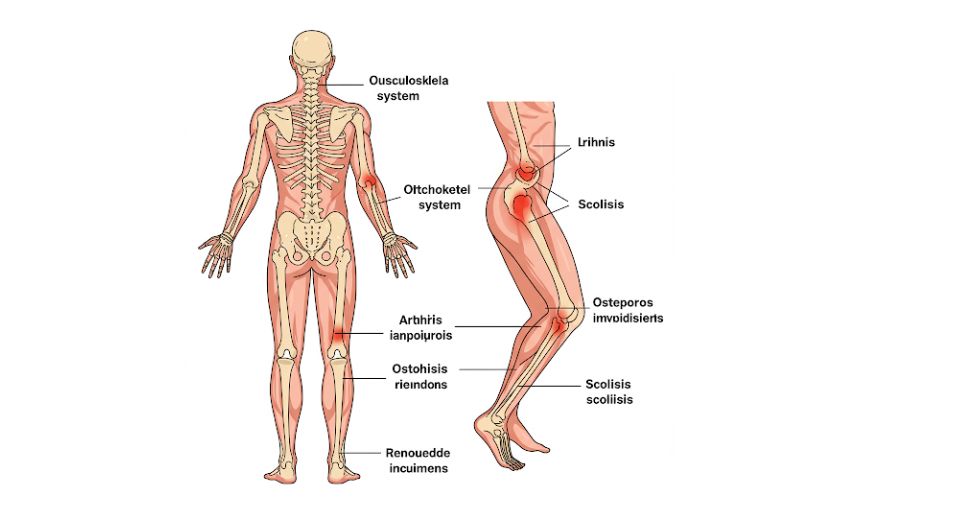
May 07, 2025

The latest report from Metastat Insight explores the direction and structuring of the Musculoskeletal System Disorders Market, with an in-depth study of how this segment of the healthcare market is still evolving based on advances in treatment practices, medical facilities, and patient knowledge. This market is a high-tech integration of the sciences of orthopedics, rheumatology, rehabilitation science, and physical therapy, each being committed to treating conditions in muscles, bones, joints, ligaments, and tendons. With an increasingly aging population globally with healthcare systems globally, how musculoskeletal disorders are handled is experiencing introspective change typified by purposeful collaboration among clinicians, researchers, and producers. Global Musculoskeletal System Disorders market is expected to increase at $4,116.83 million by 2025 with a CAGR of 6.9% during 2025-2032.
Musculoskeletal system diseases may be highly diverse in severity and extent, from transient trauma and inflammation to degenerative chronic disease. The most fascinating aspect of the discipline is the individualized treatment approach, which usually is dictated by the lifestyle, genetic profile, and disease history of the individual. Pharmacologic management, physical therapy, surgery, or a combination of these may be used, depending on the etiologic factor and patient tolerance. It is this necessity for tailored measures that has made possible an incredibly wide range of products and services within the Musculoskeletal System Disorders Market, each of which is able to permit individual therapeutic objectives and degree of patient comfort. Care is being defined by hospitals, clinics, and rehabilitation centers. Hospitals, clinics, and rehabilitation centers are all important drivers in defining how care is being provided. Most have enlarged their musculoskeletal services in view of growing demand for chronic and acute care. These clinics not only provide sites of treatment but also testing grounds for emerging diagnostic technologies and therapy technologies.
The use of health information technology gives practitioners better opportunities for the assessment of patient outcomes, streamlining the cascade of treatments, and harmonizing multidisciplinary care plans. Since musculoskeletal disorders remain one of the primary reasons for outpatient visits worldwide, the operational aspect of these centers shifts more as they try to meet pressure from increasing demands for care provision and patient satisfaction. New momentum was given to the Musculoskeletal System Disorders Market by the innovations in minimally invasive treatment and the increasing emphasis on outpatient care. Surgical procedures that have traditionally required keeping a patient in the hospital for a longer time are now performed with minimal recovery time and fewer complications, enabling patients to return early to their usual level of everyday activities. This advancement has not only increased clinical competence but also paved the way for the medical device companies to come forward with new generation products that cater to the need for intervention that is faster, safer, and comfortable. This is where the amalgamation of medical science and engineering can be most felt, as implants and devices are gradually moving towards greater sophistication.
Greater interdisciplinary practice is another trend here. Orthopedists, rheumatologists, neurologists, physical therapists, and pain management physicians are consulting with each other more than ever before. Team care guarantees a more coordinated approach to both diagnosis and long-term care. There are certain musculoskeletal disorders with overlapping features from other disorders, and their treatment involves more than one medical specialty. Such coordination is more desirable by the industry, and it is steering towards a more integrated model of care, paying equal heed to physical functioning, pain, pain management, and mental well-being.
The growth and development of such technology only further empower active patients and good outcomes. This way, solutions came into being that enable patients to remain engaged in their treatment process and maintain communication with their providers. Secondly, more diverse product pipelines and service models existed in the Musculoskeletal System Disorders Market. Pharmaceutical firms have been considering both biologic and non-biologic in their attempts to improve treatments for inflammatory and degenerative diseases. Meanwhile, physical therapy treatment has begun to include individual programs consisting of classical modalities and newly emerged ones such as hydrotherapy, electrotherapy, and virtual therapy.
Orthotic and prosthetic devices continue to become more sophisticated in order to deliver more personalized and effective performance. This diversification reflects a deeper understanding of the distinct challenges facing patients with musculoskeletal disease and the need for adaptable, patient-centered care. The insurance climate and reimbursement policies are also shaping this market configuration.
Although these factors frequently lurk in the background, they exert profound impacts on access to care and product price. Payers are assessing results more critically, thus pressuring providers and manufacturers to emphasize long-term performance and value. This imperative for accountability and quantifiable improvement is increasingly shaping the launch and acceptance of new therapies. The insightful analysis of trends and strategies in the Musculoskeletal System Disorders Market, as described in the new Metastat Insight report, addresses an era of structural change in terms of patient needs, scientific inquiry, and common models of care. With every advance, the goal is to enhance the quality of life for patients with musculoskeletal disorders and construct systems to withstand their care for a lifetime. The market stands at the crossroads where technology, knowledge, and sympathy must combine to generate meaningful progress.
Drop us an email at:
Call us on:
+1 214 613 5758
+91 73850 57479